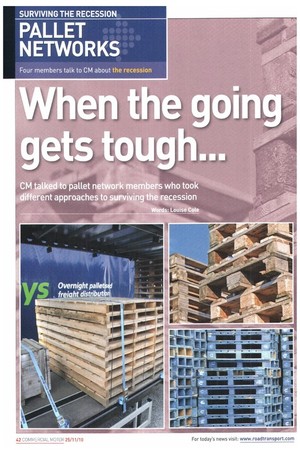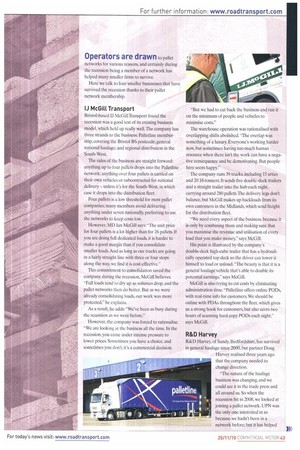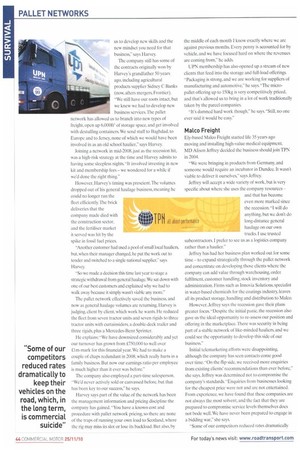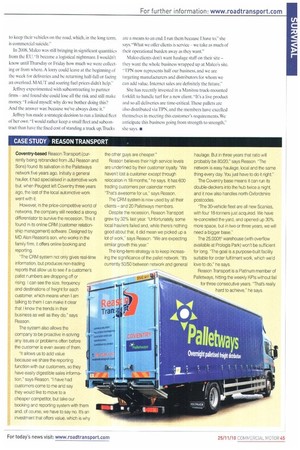CM talked to pallet network members who took different approaches to surviving the recession
Page 42

Page 43

Page 44

Page 45

If you've noticed an error in this article please click here to report it so we can fix it.
Words: Louise Cole Operators are drawn to pallet networks for various reasons, and certainly during the recession being a member of a network has helped many smaller firms to survive.
Here we talk to four smaller businesses that have survived the recession thanks to their pallet network membership.
IJ McGill Transport
Bristol-based II McGill Transport found the recession was a good test of its existing business model, which held up really well.The company has three strands to the business: Palletline membership. covering the Bristol BS postcode; general national haulage; and regional distribution in the South-West.
The rules of the business are straight forward: anything up to four pallets drops into the Palletline network; anything over four pallets is carried on their own vehicles or subcontracted for national delivery-unless it's for the South-West, in which case it drops into the distribution fleet.
Four pallets is a low threshold for most pallet companies; many members avoid delivering anything under seven nationally, preferring to use the networks to keep costs low.
However, MD Ian McGill says: "The unit price for four pallets is a lot higher than for 26 pallets. If you are doing full dedicated loads, it is harder to make a good margin than if you consolidate smaller loads. And as long as our trucks are going in a fairly straight line with three or four stops along the way, we find it is cost-effective."
This commitment to consolidation saved the company during the recession, McGill believes. "Full loads tend to dry up as volumes drop, and the pallet networks then do better. But as we were already consolidating loads, our work was more protected," he explains.
As a result, he adds: "We've been as busy during the recession as we were before."
However, the company was forced to rationalise. -Wc are looking at the business all the time. In the recession, you came under intense pressure to lower prices Sometimes you have a choice, and sometimes you don't; it's a commercial decision. "But we had to cut back the business and run it on the minimum of people and vehicles to minimise costs."
The warehouse operation was rationalised with overlapping shifts abolished. "The overlap was something of a luxury. Everyone's working harder now, but sometimes having too much human resource when there isn't the work can have a negative consequence and be demotivating. But people here seem happy."
The company runs 39 trucks, including 15 artics and 20 18-tonners, It sends five double-deck trailers and a straight trailer into the hub each night, carrying around 280 pallets. The delivery legs don't balance, but McGill makes up backloads from its own customers in the Midlands, which send freight for the distribution fleet.
"We need every aspect of the business, because it is only by combining them and making sure that you maximise the revenue and utilisation of every load that you make money," says McGill.
His point is illustrated by the company's double-deck high-cube trailer that has a hydraulically operated top deck so the driver can lower it himself to load or unload. "The beauty is that it is a general haulage vehicle that's able to double its potential earnings,says McGill.
McGill is also trying to cut costs by eliminating administration time. "Palletline offers online PODs, with real-time info for customers. We should be online with PDAs throughout the fleet, which gives us a strong hook for customers, but also saves two hours of scanning hard copy PODs each night," says McGill.
R&D Harvey
R&D Harvey, of Sandy, Bedfordshire, has survived in general haulage since 2000, but partner Doug Harvey realised three years ago that the company needed to change direction.
"The nature of the haulage business was changing, and we could see it in the trade press and all around us. So when the recession hit in 2008, we looked at joining a pallet network. UPN was the only one interested in us because we hadn't been in a network before; but it has helped us to develop new skills and the new mindset you need for that business," says Harvey.
The company still has some of the contracts originally won by Harvey's grandfather 50 years ago, including agricultural products supplier Sidney C Banks (now, afters mergers. Frontier). -We still have our roots intact, but we knew we had to develop new business services. The pallet network has allowed us to branch into new types of freight. open up 6,000ft' of storage space, and get involved with destuffing containers. We send stuff to Baghdad, to Europe and to Jersey, none of which we would have been involved in as an old school haulier," says Harvey.
Joining a network in mid-2008. just as the recession hit, was a high-risk strategy at the time and Harvey admits to having some sleepless nights."It involved investing in new kit and membership fees we wondered for a while if we'd done the right thing.
However, Harvey's timing was prescient. The volumes dropped out of his general haulage business, meaning he could no longer run the fleet efficiently. The brick deliveries that the company made died with the construction sector. and the fertiliser market it served was hit by the spike in fossil fuel prices.
"Another customer had used a pool of small local hauliers, but, when their manager changed, he put the work out to tender and switched to a single national supplier," says Harvey.
"So we made a decision this time last year to stage a strategic withdrawal from general haulage. We sat down with one of our best customers and explained why we had to walk away because it simply wasn't viable any more."
The pallet network effectively saved the business, and now as general haulage volumes are returning, Harvey is judging. client by client, which work he wants. He reduced the fleet from seven tractor units and seven rigids to three tractor units with curtainsiders, a double-deck trailer and three rigid& plus a Mercedes-Benz Sprinter.
He explains: -We have downsized considerably and yet our turnover has grown from £750,000 to well over flm-mark for this financial year. We had to make a couple of chaps redundant in 2008, which really hurts in a family business. But now our earnings ratio per employee is much higher than it ever was before."
The company also employed a part-time salesperson. "We'd never actively sold or canvassed before, but that has been key to our success," he says.
Harvey says part of the value of the network has been the management information and pricing discipline the company has gained. -You have a known cost and procedure with pallet network pricing, so there are none of the traps of running your own load to Scotland, where the rig may miss its slot or lose its backload. But also, by
(guil T P
all about
the middle of each month I know exactly where we are against previous months. Every penny is accounted for by vehicle, and we have focused hard on where the revenues are coming from," he adds.
UPN membership has also opened up a stream of new clients that feed into the storage and full-load offerings. "Packaging is strong, and we are working for suppliers of manufacturing and automotive,he says. "The micropallet offering up to 150kg is very competitively priced, and that's allowed us to bring in a lot of work traditionally taken by the parcel companies.
-It's damned hard work though," he says."Still, no one ever said it would be easy."
Meta) Freight
Ely-based Malco Freight started life 35 years ago moving and installing high-value medical equipment. MD Alison Jeffrey decided the business should join TPN in 2004.
"We were bringing in products from Germany, and someone would require an incubator in Dundee. It wasn't viable to deliver it ourselves," says Jeffrey.
Jeffrey will accept a wide variety of work, but is very specific about where she uses the company resources and that has become even more marked since the recession. "I will do anything, but we don't do long-distance general haulage on our own trucks. I use trusted subcontractors. I prefer to see us as a logistics company rather than a haulier."
perforflIdlIC2
Jeffrey has had her business plan worked out for some time to expand strategically through the pallet network and concentrate on developing those clients where the company can add value through warehousing, order fulfilment, customer handling, stock inventory and administration. Firms such as Innovia Solutions, specialist in water-based chemicals for the coatings industry, leaves all its product storage, handling and distribution to Malco.
However, Jeffrey says the recession gave their plans greater focus. "Despite the initial panic. the recession also gave us the ideal opportunity to re-assess our position and offering in the marketplace. There was security in being part of a stable network of like-minded hauliers, and we could see the opportunity to develop this side of our business.
Initial telemarketing efforts were disappointing, although the company has seen contacts come good over time. "On the flip side, we received more enquiries from existing clients' recommendations than ever before," she says. Jeffrey was determined not to compromise the company's standards. -Enquiries from businesses looking for the cheapest price were not and are not entertained. From experience, we have found that these companies are not always the most solvent, and the fact that they are prepared to compromise service levels themselves does not bode well. We have never been prepared to engage in a bidding war," she says.
"Some of our competitors reduced rates dramatically to keep their vehicles on the road, which, in the long term. is commercial suicide."
In 2008. Malco was still bringing in significant quantities from the EU. -It became a logistical nightmare. I wouldn't know until Thursday or Friday how much we were collecting or from where. A lorry could leave at the beginning of the week for deliveries and be returning half-full or facing an overload. MAUT and soaring fuel prices didn't help."
Jeffrey experimented with subcontracting to partner finins and found she could lose all the risk and still make money. asked myself: why do we bother doing this? And the answer was: because we've always done it."
Jeffrey has made a strategic decision to run a limited fleet of her own. "I would rather keep a small fleet and subcontract than have the fixed cost of standing a truck up. Trucks are a means to an end. I run them because I have to," she says. "What we offer clients is service we take as much of their operational burden away as they want."
Mateo clients don't want haulage staff on their site they want the whole business wrapped up at MaIco's site. "TPN now represents half our business, and we are targeting manufacturers and distributors for whom we can add value. Internet sales are definitely the future."
She has recently invested in a Manitou truck-mounted forklift to handle turf for a new client. "It's a live product and so all deliveries are time-critical. These pallets are also distributed via TPN, and the members have excelled themselves in meeting this customer's requirements. We anticipate this business going from strength to strength," she says. •




































































































































